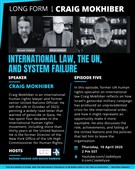[The following report was released by Human Rights Watch on 31 January 2013.]
Moroccans still await tangible improvements in human rights a year after the adoption of a progressive new constitution and the election of an Islamist-led parliament and government, Human Rights Watch said today in its World Report 2013.
Even as government ministers talked of reform, the courts imprisoned dissidents during 2012 under repressive laws curtailing free speech, and after unfair trials. The police used excessive force against demonstrators, and abused the rights of migrants and advocates of self-determination for Western Sahara faced continuing repression.
“Judging by the text of the 2011 constitution, Morocco’s leaders recognize that enhancing human rights is central to meeting popular aspirations,” said Sarah Leah Whitson, Middle East and North Africa director at Human Rights Watch. “But judging by the practice on the ground, they have yet to grasp that words alone are not enough.”
In its 665-page report, Human Rights Watch assessed progress on human rights during the past year in more than ninety countries, including an analysis of the aftermath of the Arab uprisings. The willingness of new governments to respect rights will determine whether the Arab uprisings give birth to genuine democracy or simply spawn authoritarianism in new clothes, Human Rights Watch said.
Among those imprisoned in Morocco for exercising their right to free speech are journalist Rachid Nini, who served one year in prison for his writing; rapper Mouad Belghouat, who is serving a one-year prison term for a song critical of the police; and twenty-two Sahrawis, who have spent more than two years in pre-trial detention far from their homes in a politically charged case.
Moroccan police allowed some public protests to go ahead unmolested but on other occasions used excessive force to disperse demonstrations, regardless of whether they were peaceful or disorderly. In one recent instance, on 27 December, police beat and dragged a member of parliament, Abdessamad Idrissi, after he intervened as they were violently dispersing a protest by unemployed people in front of the parliament in Rabat.
Courts sometimes sentenced demonstrators to prison terms after convicting them in unfair trials of charges such as assaulting or insulting police officers. For example, an appeals court in January 2013 sentenced to prison five demonstrators who support the February 20 movement, created at the time of pro-reform protests in 2011, on the basis of confessions that they claimed had been beaten out of them, and without any witness testimony or other evidence presented in court that linked them to the offenses.
The authorities severely restrict the rights of those who advocate self-determination for Western Sahara, which has been under de facto Moroccan rule since 1975. Morocco refuses to allow pro-independence demonstrations in Western Sahara or to permit the legal recognition of associations whose leaders are known to favor independence. This policy is underpinned by legislation that prohibits “harming” Islam, the monarchy, and Morocco’s “territorial integrity.” The last phrase is understood to mean Morocco’s claim to, and annexation of, Western Sahara. Abolishing such laws should be a priority as Morocco sets about harmonizing its legislation with the 2011 constitution, Human Rights Watch said.
Reports of abuse of Sub-Saharan migrants in Morocco increased during the year. The abuse included raids in which police arbitrarily destroyed and seized property and forcibly bused migrants to the Algerian border, dumping many of them there in a manner that violates due process.
Despite the slow pace of reform, some positive developments pointed the right way forward, Human Rights Watch said. Notably, the government allowed the UN special rapporteur on torture to visit Morocco and Western Sahara in September, and the National Council of Human Rights, a state-funded body that reports to the king, issued groundbreaking reports criticizing conditions in the country’s prisons and state-run mental institutions.
On the issue of media freedom, the Communication Ministry announced that Al Jazeera would be permitted to reopen its office in Rabat. The government had ordered the office closed in 2010, in dissatisfaction over its news reporting.
“Human rights issues are widely and openly discussed in Morocco, and this is a real plus,” Whitson said. “But even as authorities deliberate and consult on the reform process, they need to show the political will to curtail the abuses that persist.”
Read the entire report here.
![[Human Rights Watch logo. Image from hrw.org]](https://kms.jadaliyya.com/Images/357x383xo/ScreenShot2013-02-06at9.13.41PM.png)
















